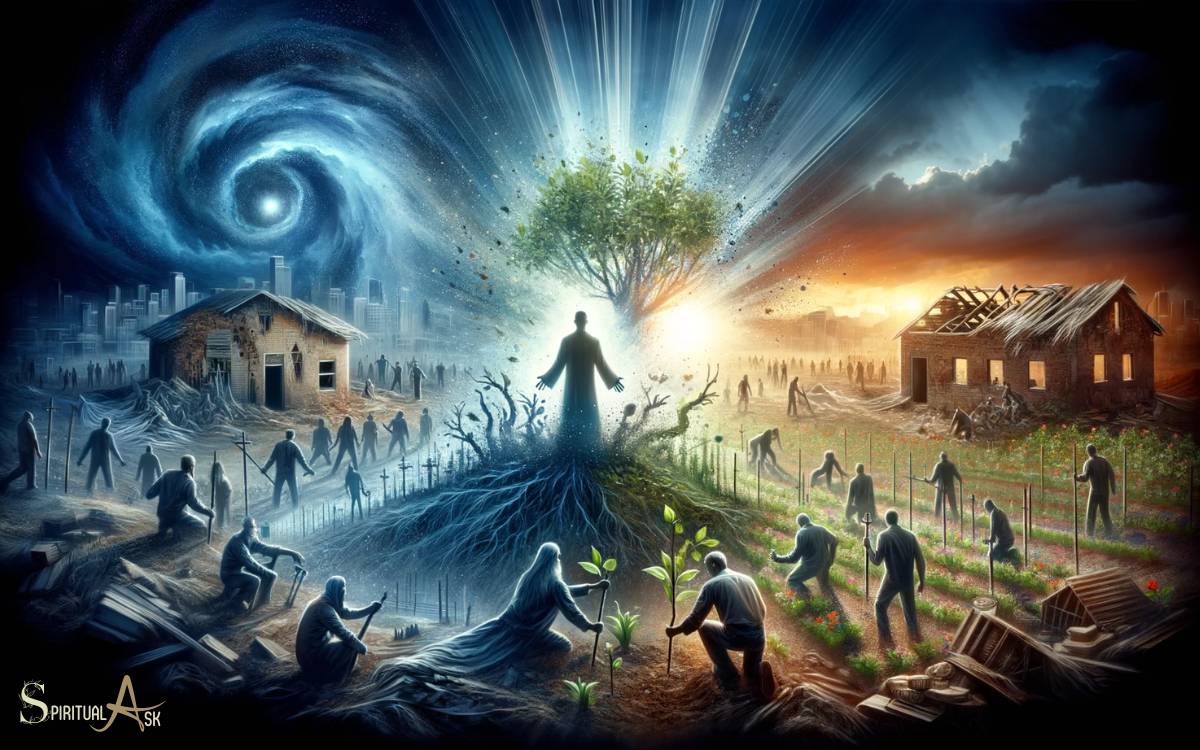Territorial Spirits And Spiritual Warfare: Demonic Entities!
Territorial spirits are demonic entities that hold influence and authority over specific geographical regions, while spiritual warfare is the struggle believers face against these forces in an effort to liberate people and places under their control.
Territorial spirits, as described in the Bible and spiritual literature, are powerful demons assigned to different areas of the earth to control, manipulate, and oppress the people living in those regions.
Spiritual warfare, on the other hand, is the battle between the kingdom of God and the kingdom of darkness, involving believers engaging in prayer, fasting,
Various spiritual disciplines to counteract the activities of these malevolent forces.
Territorial spirits and spiritual warfare are interconnected concepts in the field of spiritual beliefs. Identifying and addressing territorial spirits in a specific location can help believers focus their prayers and spiritual efforts more effectively.
By engaging in spiritual warfare, believers aim to break the stronghold these spirits have on individuals and communities,
Ultimately bringing positive transformation and the expansion of God’s kingdom in the affected regions.

Key Takeaway
5 Territorial Spirits And Spiritual Warfare Techniques
| Territorial Spirits | Description | Examples | Spiritual Warfare Techniques |
|---|---|---|---|
| Principalities | High-ranking demonic beings with authority over specific geographical areas. | Satan, Lucifer | Prayer and intercession, fasting, worship, and declarations of God’s sovereignty |
| Powers | Demonic beings that carry out the orders of principalities, often working to influence human behavior and corrupt systems. | Legions, demonic strongholds | Binding and loosing, breaking curses, using God’s Word (the Bible) as a weapon, wearing spiritual armor (Ephesians 6) |
| Rulers of Darkness | Entities that work behind the scenes to manipulate individuals and groups to spread darkness, chaos, and confusion. | Spiritual blindness, deception | Prophetic intercession, spiritual discernment, revealing hidden things, shining the light of Christ |
| Spiritual Wickedness in High Places | Evil forces that infiltrate and influence political, economic, and social systems. | Corruption, greed, oppression | Exposing evil, prophetic declarations, advocating for justice and righteousness, standing against wickedness |
| Strongholds | Belief systems, thought patterns, and behaviors that give demonic spirits power over individuals or communities. | Addiction, fear, bitterness | Renewing the mind, tearing down strongholds through prayer and spiritual authority, applying God’s truth |
4 Facts About Territorial Spirits and Spiritual Warfare
Understanding Territorial Spirits
In the realm of spiritual warfare, territorial spirits represent a complex concept, referring to supernatural entities believed to hold sway over specific geographical areas.

You’re navigating a theory suggesting that these spirits influence the spiritual, social, and sometimes the economic well-being of the regions under their control.
This notion postulates that the spiritual atmosphere of a place can be directly affected by the presence or absence of such entities.
Scholars and practitioners argue that understanding the dynamics of territorial spirits is crucial for effective spiritual warfare, as it involves identifying and combating these forces to bring about change.
The concept also underscores the belief that spiritual liberation for individuals and communities requires addressing these territorial influences.
This understanding necessitates a nuanced approach to spiritual engagement, recognizing the layered complexity of spiritual dominions and their impact on the physical realm.
Biblical Foundations

Exploring the concept of territorial spirits, it’s essential to examine their biblical foundations to understand their significance in spiritual warfare. The Bible provides various instances that underpin the existence and influence of these spirits over specific regions.
Here’s a concise overview:
| Passage | Description |
|---|---|
| Daniel 10:13 | Daniel’s prayer is hindered by the “Prince of Persia,” a territorial spirit, until Michael, an archangel, intervenes. |
| Ephesians 6:12 | Paul speaks of spiritual forces of evil in heavenly realms, indicating a structured hierarchy of spiritual adversaries. |
| Mark 5:10 | The Legion pleads with Jesus not to be sent out of the area, suggesting a territorial attachment. |
| Acts 16:16-18 | Paul encounters a spirit of divination in Philippi, illustrating local spiritual influence. |
These passages collectively indicate a biblical basis for the concept of territorial spirits, framing an intricate aspect of spiritual warfare.
Historical Context

You’ll find that the concept of territorial spirits has roots deeply embedded in ancient beliefs. This exploration starts with an overview of these early notions before examining how the concepts evolved over time.
Understanding this historical trajectory is crucial for comprehending the contemporary nuances of spiritual warfare.
Ancient Beliefs Overview
Ancient civilizations universally held the belief that spirits, both benevolent and malevolent, governed territories and influenced human affairs. This perspective was foundational to understanding the world around them and their place within it.
Here’s a concise breakdown of their core beliefs:
- Territorial Dominance: Certain spirits were thought to have control over specific geographical areas, influencing the prosperity or misfortune of those regions.
- Rituals and Offerings: Engaging in specific rituals and offering sacrifices were believed to appease these spirits, ensuring peace and abundance for the community.
- Intermediaries: Priests, shamans, or designated spiritual leaders served as intermediaries between humans and these territorial spirits, guiding the community in practices to maintain harmony.
Understanding these ancient beliefs offers insight into the complex relationship between spirituality and geography in historical contexts.
Evolution of Concepts

As beliefs and societies evolved, the understanding of territorial spirits and their influence underwent significant transformation, reflecting broader changes in religious and cultural paradigms.
Initially, these entities were often viewed as localized deities or ancestors with specific territorial dominion. However, as monotheistic religions gained prominence, the concept shifted towards a more dualistic interpretation, framing these spirits within a cosmic battle between good and evil.
This evolution wasn’t linear or uniform across cultures; it mirrored the complex interplay of indigenous beliefs, external religious influences, and socio-political changes.
Consequently, the role and perception of territorial spirits in spiritual warfare became multifaceted, embodying both ancient traditions and adaptations to new religious landscapes.
This dynamic history highlights the adaptability of spiritual concepts in meeting the changing needs and understandings of societies.
Theological Perspectives

Theological perspectives on territorial spirits and spiritual warfare vary widely across different Christian denominations and traditions.
- Conservative Evangelicals often emphasize a literal interpretation of spiritual warfare, including the belief in specific territorial spirits that influence regions or groups.
- Mainline Protestants might lean towards a metaphorical understanding, viewing the concept of territorial spirits more as symbols of systemic sin or social evil rather than literal demonic entities.
- Catholic and Orthodox Christians incorporate a rich tradition of spiritual warfare within their theology but tend to focus more on personal sin and redemption, with a nuanced view on the influence of evil spirits.
Each tradition brings a unique lens to understanding spiritual warfare, deeply rooted in their doctrinal teachings and historical experiences.
Identifying Territorial Strongholds

You need to recognize spiritual boundaries to understand how territorial spirits operate within specific locales. Analyzing stronghold characteristics allows you to discern patterns and strategies these spirits use to assert control.
This approach is critical for developing effective spiritual warfare tactics.
Analyzing Stronghold Characteristics
To effectively combat territorial spirits, it’s essential to delve into the characteristics that define these spiritual strongholds.
You’ll find that these entities often manifest through consistent patterns of negativity or oppression within specific locales.
It’s not just about a feeling; it’s about observable, repetitive outcomes that negatively impact communities.
Identifying these strongholds requires a keen sense of discernment and an understanding of the spiritual underpinnings that influence physical realities.
Recognizing Spiritual Boundaries

Identifying territorial strongholds requires an understanding of the spiritual boundaries that demarcate areas of influence and control within the realm of spiritual warfare.
These boundaries aren’t physical but rather spiritual demarcations that define the extent of a territorial spirit’s influence.
To recognize these spiritual boundaries, you need to:
- Observe patterns of spiritual oppression or resistance within specific geographic or social areas.
- Discern the historical and cultural factors that may have established or reinforced these spiritual boundaries.
- Engage in spiritual discernment through prayer and meditation, seeking insight into the nature and limits of these territorial influences.
Understanding these boundaries is crucial for effectively engaging in spiritual warfare, as it helps you to target your prayers and actions more strategically, respecting the complex spiritual dynamics at play.
Spiritual Warfare Strategies

Understanding effective spiritual warfare strategies is critical for addressing and combating the influence of territorial spirits. To navigate this complex landscape, it’s essential to adopt a multifaceted approach.
Here are three key strategies:
- Scriptural Engagement: Immerse yourself in biblical teachings and principles. Knowledge of scripture empowers you to identify and refute the deceptions of territorial spirits.
- Community Intercession: Leverage the collective prayer and support of your faith community. There’s strength in numbers, and a unified spiritual front can be formidable against territorial influences.
- Holistic Discernment: Apply discernment in every aspect of life, recognizing the subtle ways in which territorial spirits can influence thoughts, behaviors, and environments. This involves being vigilant and seeking guidance for understanding the spiritual undercurrents at play.
These strategies, grounded in faith and collective action, form a robust defense against the workings of territorial spirits.
Prayer and Fasting

Among the most potent spiritual practices, prayer and fasting serve as foundational tools in combating the influence of territorial spirits. These disciplines, deeply rooted in historical and biblical precedents, facilitate a heightened spiritual sensitivity and authority.
You’ll find that through prayer, you’re engaging in direct communication with the divine, petitioning for intervention in the spiritual realm.
Fasting, on the other hand, isn’t merely abstention from physical nourishment but signifies a deliberate focus and consecration to spiritual matters over temporal concerns.
This combination intensifies your spiritual discernment, enabling you to identify and address the specific strongholds and strategies of territorial spirits effectively.
It’s a practice that demands sincerity, commitment, and a profound understanding of spiritual warfare principles, devoid of any superficiality.
The Role of the Church
You must recognize the church’s spiritual authority as a cornerstone in confronting territorial spirits.

It’s imperative to understand how this authority is operationalized, especially through mobilizing prayer warriors.
This approach underscores the strategic role of the church in spiritual warfare, offering a framework for effective engagement.
Church’s Spiritual Authority
The church holds a pivotal role in exercising spiritual authority over territorial spirits, grounded in theological beliefs and practices.
This authority is derived from scriptural mandates and historical traditions, emphasizing the church’s role as a mediator between the divine and the earthly realms.
Here are three key aspects of this authority:
- Intercessory Prayer: The church engages in collective prayers to combat spiritual forces, invoking divine intervention in the spiritual realm.
- Teaching and Discipleship: By educating its members about spiritual warfare, the church empowers believers with knowledge and tools for individual and communal battles.
- Sacramental Acts: Practices such as communion, baptism, and anointing are seen as means of grace, fortifying the community against spiritual attacks.
These dimensions underscore the church’s multifaceted approach to asserting its spiritual dominion.
Mobilizing Prayer Warriors

In mobilizing prayer warriors, churches play a crucial role in coordinating and amplifying the spiritual warfare against territorial spirits. By harnessing collective faith and dedication, they effectively counteract the influences of these entities.
The church’s role isn’t merely organizational; it’s fundamentally strategic. They identify specific territorial spirits through discernment, guiding prayer efforts towards these targets with precision.
This targeted approach ensures that prayers aren’t scattered but focused, increasing their effectiveness.
Churches also provide training and resources, equipping believers with the knowledge and spiritual tools necessary for this battle.
Furthermore, they foster a supportive community, encouraging sustained commitment and sharing testimonies of victories, which bolsters faith and determination among the congregation.
Thus, churches are pivotal in mobilizing an informed, united, and potent force of prayer warriors.
Personal Testimonies

Numerous individuals have shared personal encounters with territorial spirits, revealing complex interactions that challenge conventional spiritual warfare paradigms.
These testimonies often highlight:
- Unexpected Encounters: People recount experiences where they faced spiritual entities tied to specific geographical regions, leading to unforeseen spiritual battles.
- Diverse Strategies: Testimonies detail a variety of methods used to engage with these spirits, from prayer and fasting to the invocation of higher spiritual authority.
- Personal Transformation: Individuals frequently report significant personal growth and deeper spiritual insight as a result of these encounters.
Such narratives contribute to a richer understanding of spiritual warfare, emphasizing the nuanced and personal nature of these battles.
They invite a reevaluation of traditional approaches, suggesting that flexibility and spiritual discernment are crucial in navigating these complex spiritual landscapes.
Cultural Impacts
You must consider how societal beliefs shape the perception and engagement with territorial spirits and spiritual warfare.

The rituals practiced across various cultures provide a window into understanding these interactions. This analysis will reveal the profound impact these beliefs and practices have on communities worldwide.
Societal Beliefs Influence
Societal beliefs profoundly shape the perception and engagement with the concept of territorial spirits within different cultures.
You’ll find that these beliefs influence:
- Perception of Reality: The way individuals and communities perceive the spiritual realm and its impact on the physical world varies greatly. A society’s historical and religious background plays a crucial role in this perception.
- Behavioral Norms: Actions deemed necessary to appease or combat territorial spirits are deeply rooted in societal beliefs. These norms dictate both personal and communal practices.
- Community Cohesion: Shared beliefs in territorial spirits can strengthen the social fabric, creating a unified response to perceived spiritual threats. However, they can also lead to divisions if interpretations or beliefs differ significantly within or between communities.
Rituals Across Cultures

Across various cultures, rituals addressing territorial spirits manifest in diverse and complex forms, reflecting each society’s unique spiritual landscape and historical context.
These practices, steeped in tradition, serve not only as a means of spiritual warfare but also as a way to maintain the equilibrium between the physical and spiritual realms.
In some cultures, rituals involve elaborate ceremonies with music, dance, and offerings to appease or communicate with these spirits. In others, the focus might be on prayer, fasting, and the invocation of higher powers for protection.
These rituals, regardless of their outward expressions, highlight a universal understanding of the influence of unseen forces on the physical world.
They underscore the belief in the power of collective human action to engage with and influence these spiritual entities.
Overcoming Challenges

In navigating the complexities of spiritual warfare, believers must employ strategic approaches to effectively counteract the influence of territorial spirits. This involves understanding the challenges and devising methods to overcome them.
Here are key strategies:
- Knowledge Acquisition: You must deepen your understanding of spiritual realms and the specific characteristics of territorial spirits. This knowledge is foundational for effective engagement.
- Community Engagement: Building a supportive community is crucial. You’re stronger when united in prayer and purpose, harnessing collective faith and resources.
- Personal Spiritual Discipline: Consistently nurturing your spiritual life through prayer, fasting, and meditation fortifies your spirit against attacks and enhances discernment.
Adopting these strategies empowers you to confront and overcome the challenges posed by territorial spirits, fostering a path towards spiritual victory.
Tools for Deliverance
Several tools have emerged as effective means for believers to achieve deliverance from the influence of territorial spirits. Fasting and prayer stand as foundational practices, facilitating a deeper spiritual connection and empowerment.

Scriptural declarations, invoking the authority of biblical texts, serve as both a shield and a sword against spiritual adversaries. The sacraments, particularly confession and the Eucharist, offer profound spiritual renewal and protection.
Additionally, the anointing of oil, rooted in biblical tradition, symbolizes sanctification and healing. These tools, when utilized with faith and understanding, equip individuals and communities to confront and overcome the challenges posed by territorial spirits.
It’s imperative, however, to approach these practices with humility and seek guidance from experienced spiritual leaders.
Community Transformation

Understanding the role of territorial spirits in shaping community dynamics offers a critical lens through which one can examine potential pathways for transformative change.
You’re guided to consider the spiritual undercurrents that influence societal structures, behaviors, and ideologies. This perspective necessitates a nuanced approach to community transformation, focusing on spiritual, social, and cultural dimensions.
The strategies for engaging in this transformative work include:
- Prayer and Spiritual Discernment: Identifying and understanding the specific spiritual forces at play within a community.
- Community Engagement and Empowerment: Fostering collaborations and empowering individuals to actively participate in their community’s spiritual and social renewal.
- Education and Awareness: Raising consciousness about the impact of spiritual forces on community life and the importance of holistic transformation.
These components are essential for initiating meaningful change in communities influenced by territorial spirits.
Future Implications

Exploring the future implications of territorial spirits on community transformation reveals the potential for profound societal shifts. You’ll find that understanding the dynamics of spiritual warfare is crucial for fostering holistic community development.
As you delve deeper, it becomes apparent that spiritual beliefs and practices significantly influence socio-economic conditions and communal well-being.
If you’re actively engaged in spiritual or community leadership, recognizing and addressing the influence of these spirits is imperative for effecting positive change.
This approach not only acknowledges the spiritual dimensions of community issues but also opens up avenues for innovative solutions rooted in spiritual liberation and empowerment.
Embracing this perspective could catalyze a paradigm shift, transforming communities into more resilient, unified, and spiritually vibrant entities.
How Do Territorial Spirits and Demonic Entities Interact in Spiritual Warfare?
Spiritual warfare realms explanation context of spiritual warfare, territorial spirits and demonic entities are believed to operate within specific domains or regions, influencing individuals, communities, and even nations.
- Territorial Spirits: These are thought to hold sway over particular geographical areas or social groups, attempting to exert control and influence over the population’s beliefs and behaviors.
- Demonic Entities: These are considered malevolent spirits that can oppress or possess individuals, causing spiritual, emotional, or physical harm.
Interactions in Spiritual Warfare:
- Influence: Territorial spirits and demonic entities may interact by influencing the spiritual atmosphere of a place, affecting the mindset and actions of people within it.
- Opposition: In spiritual warfare, believers may engage in prayer or other spiritual practices to counteract the negative influences of these spirits.
- Hierarchy: Some belief systems suggest a hierarchical structure among these spirits, with territorial spirits having authority over lower-ranking demonic entities.
Understanding the interplay between territorial spirits and demonic entities is crucial for those engaged in spiritual warfare, emphasizing the need for vigilance and spiritual discernment in combating these forces. Understanding deceptive spirits requires a keen awareness of their tactics and the ability to recognize their influence in various situations. By staying rooted in prayer and studying the Word of God, individuals can develop the discernment needed to differentiate between the influence of territorial spirits and demonic entities. This understanding is essential for effectively engaging in spiritual warfare and standing firm against the schemes of the enemy.
Conclusion
You’ve traversed the complex realm of territorial spirits and spiritual warfare, unearthing its biblical roots and historical layers. You’ve dissected theological perspectives, pinpointed strongholds, and explored deliverance tools.
This journey not only equips you for overcoming present challenges but also prepares you for future implications in community transformation.
As you wield this ancient wisdom in a modern era, remember, the key to victory lies in understanding the nuanced battleground and the power of collective faith.
FAQ About Territorial Spirits and Spiritual Warfare
What Are Territorial Spirits?
Territorial spirits are spiritual forces believed to control geographical areas and influence the behavior of its inhabitants.
What Is Spiritual Warfare?
Spiritual warfare is a concept that refers to the spiritual battle between good and evil forces, and the ways in which individuals can engage in prayer and other spiritual practices to combat negative influences.
How Can I Participate In Spiritual Warfare?
Participation in spiritual warfare involves engaging in spiritual practices such as prayer, fasting, and repentance, and seeking the guidance and protection of god.
Can Territorial Spirits Be Defeated?
Yes, the power of prayer and faith can overcome the influence of territorial spirits and other negative spiritual forces, as well as provide protection and guidance in everyday life.






